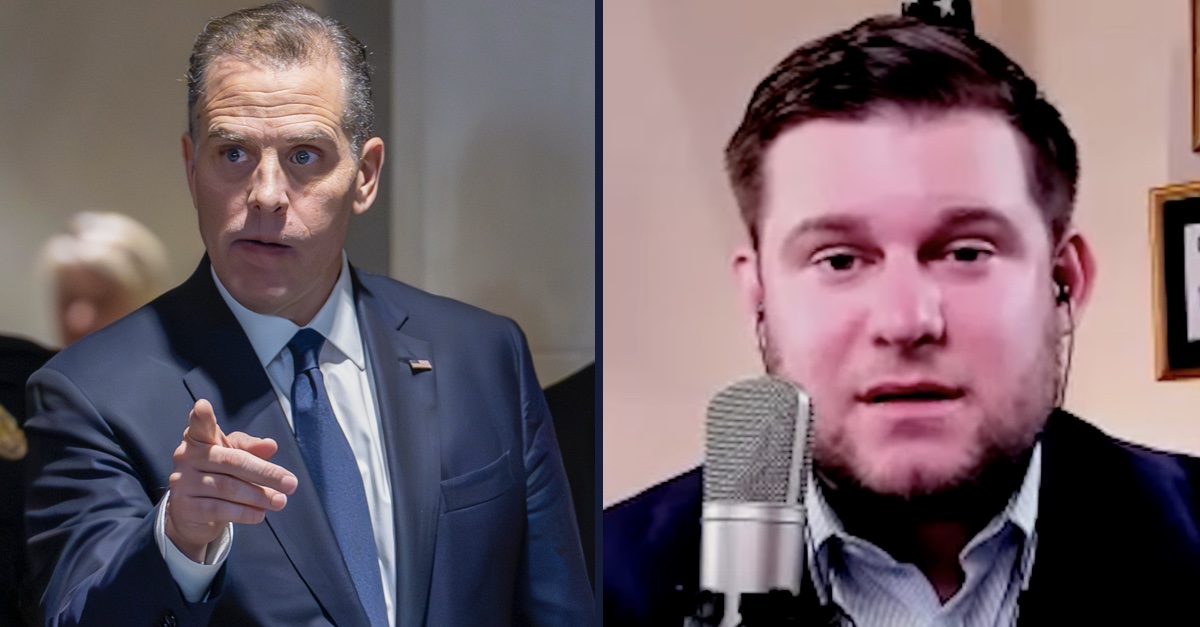
Hunter Biden (AP Photo/J. Scott Applewhite), Garrett Ziegler talks Hunter Biden on YouTube (YouTube/Reporter.London screengrab)
Noting that Donald Trump lost out multiple times when trying to remove a judge from his failed Trump v. Hillary Clinton RICO lawsuit based on the president who appointed the jurist and the political nature of the case, Hunter Biden argued Thursday that the request of a onetime policy analyst in the Trump White House for the recusal of a Joe Biden appointee and campaign donor should likewise go nowhere.
The dispute over U.S. District Judge Hernan Vera, a 2023 Joe Biden appointee in the Central District of California, arose in Biden’s Computer Fraud and Abuse Act (CFAA) lawsuit against Garrett Ziegler and his company ICU, LLC, doing business as the Marco Polo website which posted the “Biden Laptop Report.”
Ziegler, who once worked for former Trump trade adviser Peter Navarro as associate director in the Office of Trade and Manufacturing Policy, first pushed in March for Vera’s recusal on the idea that it would be inappropriate for a judge appointed by Joe Biden — and who donated to Biden’s 2020 election campaign — to handle a case involving the president’s son that could block “investigative reporting and contents on the Biden Laptop, possibly impacting the impeachment investigation.”
Ziegler’s lawyers asserted that their recusal motion was based on the “subject matter of the litigation, the relief sought, and the surrounding facts and circumstances [that] would cause a reasonable observer to question whether Judge Vera’s decisions in this case will be impartial,” not merely a complaint that he was appointed by Joe Biden and made a political donation years before his appointment.
Hunter Biden’s attorneys have since responded that Ziegler, whom they have accused of “hacking into” an “encrypted iPhone backup” to expose the “hard drive of the claimed ‘Biden laptop,”” fell well short of persuasively arguing for Vera’s recusal — and the plaintiff referenced Trump v. Clinton four times.
In that case, U.S. District Judge Donald M. Middlebrooks, appointed by former President Bill Clinton, refused to recuse himself, writing that he had “never met or spoken with” the Clintons. Thereafter, Trump attorneys sought the judge’s disqualification a second time, this time claiming “politically charged language in the Court’s recent opinions and the extrajudicial factual research performed by the Court” created the “appearance of bias.” That didn’t work either.
Biden said the failed RICO lawsuit was “instructive” in the Ziegler matter since the recusal motion is plainly about removing a judge based on which president appointed him to the bench.
“In any event, Plaintiff’s motive for bringing the suit, and his relationship to President Biden, have nothing to do with Judge Vera’s partiality in presiding over the case, and Defendants’ argument is simply a recasting of their failed argument that the identity of an appointing president requires recusal,” the filing said. “Trump v. Clinton is instructive. There, former President Trump sued former Secretary of State Hillary Clinton, then moved to recuse the district judge on the ground that he was appointed by President Bill Clinton.”
The president’s son then called the defendants’ “imaginary and baseless” attempt to stitch together a rationale for Vera’s recusal “the legal equivalent of multiplying by zero”:
Although none of the facts Defendants identify with respect to Judge Vera warrant recusal, Defendants attempt the legal equivalent of multiplying by zero, and argue that when taken together under the circumstances, their deficient facts somehow mandate that Judge Vera be recused. The “surrounding facts and circumstancesv Defendants point to include Plaintiff’s purported motive “to avenge his family” via this lawsuit; and the “magnitude of the relief requested”—i.e., an injunction preventing Defendants from further accessing or tampering with Plaintiffs’ data, which Defendants claim could affect the pending impeachment inquiry of President Biden and impede public access to the data. Defendants’ arguments are imaginary and baseless—and in many respects counterfactual—and they are based on inapposite caselaw.
In a separate filing, Biden’s lawyers dinged Ziegler’s team for a “factual error” about the timeline of Vera’s ascent to the federal bench.
“In Paragraphs 23 and 28 of their Request, Defendants seek judicial notice of the purported fact that Judge Vera was ‘appointed’ by President Biden on June 13, 2023,” court documents said. Not only is this purported fact ‘not subject to reasonable dispute’ as required for judicial notice under Rule 201, it is wrong. As a quick review of Judge Vera’s biographical information shows, he was confirmed by the Senate on June 13, but he was nominated on January 3, 2023, and did not take the bench until receiving his commission, on June 15, 2023.”
While the plaintiff acknowledged the “factual error is not central” to the recusal motion, Biden claimed it showed that the Ziegler defendants are looking to “stimulate support in right-wing media” and stoke “suspicion” about Vera.
A hearing on the issue was scheduled for the afternoon of April 25.
Read Hunter Biden’s filing opposing the judge’s recusal here.
Have a tip we should know? [email protected]

